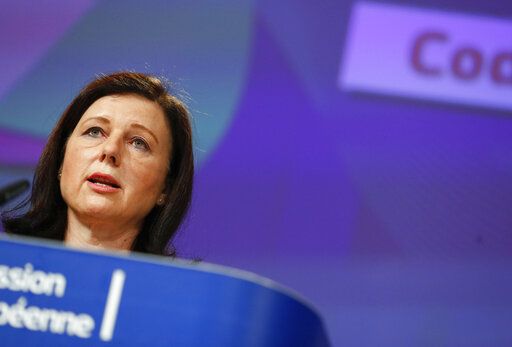EU beefs up disinformation code amid Russia fake news fears
FILE – European Commissioner for Values and Transparency Vera Jourova addresses a media conference on the guidance for strengthening the code of practice on disinformation at EU headquarters in Brussels, Wednesday, May 26, 2021. The European Union is beefing up its code of practice on disinformation by enlisting more tech companies and adding measures to prevent online purveyors of fake news from profiting. (Johanna Geron, Pool via AP, File)
LONDON (AP) — The European Union is beefing up its code of practice on disinformation by enlisting more tech companies beyond Google, Twitter and Facebook parent Meta and adding measures to prevent online purveyors of fake news from profiting.
The EU’s executive Commission unveiled an update Thursday to its four-year-old voluntary code that, together with sweeping new rules in the pipeline for digital companies, will step up its efforts to fight the spread of false information in the 27-member bloc.
EU leaders are alarmed about disinformation flourishing on online platforms, notably involving the COVID-19 pandemic and Russian propaganda amid the war in Ukraine. The code shows Europe’s efforts to take a global lead in clamping down on fake news, while officials in the U.S. have done little to curb its spread.
Disinformation “is a growing problem in the EU, and we really have to take stronger measures,” Commission Vice President Vera Jourova told reporters in Brussels.
She said the update comes as Russia weaponizes disinformation as part of its war in Ukraine “but also when we see attacks on democracy more broadly.”
Companies that sign up to the EU code agree to commit to measures aimed at reducing disinformation. They will have to file regular reports on whether they’re living up to their promises, though there’s little in the way of punishment.
The code is, however, backed by the EU’s upcoming Digital Services Act, a wide-ranging overhaul of the bloc’s digital rulebook that includes requirements for tech giants to address “systemic risks” on their platforms, including the spread of disinformation, under the threat of big fines.
Some 33 online platforms, tech companies, and civil society groups have now signed up to the voluntary code, double the number from a year ago. The newest additions include Amazon-owned video game streaming service Twitch, video sharing platform Vimeo and audio-only social network Clubhouse.
Companies that previously signed up include Google, Facebook and Instagram parent Meta, Twitter, TikTok and Microsoft. Other big tech companies like Amazon and Apple are still absent. Also missing are apps like Telegram, a social media and messaging platform where Russian government disinformation is rampant.
Fact-checking and press freedom groups and ad-tech companies also have joined.
The code includes measures preventing ads from being shown next to fake news content so the material can’t be used to make money.
Producers of disinformation make big money, as do online platforms and the digital ad industry, and “the code will disrupt this financing model,” Jourova said.
There also are requirements for more transparency on political ads, such as adding labels; reducing manipulative techniques like automated bot accounts; and giving users tools to recognize and flag up false information so it can be taken down.
Copyright 2022 The Associated Press. All rights reserved.


